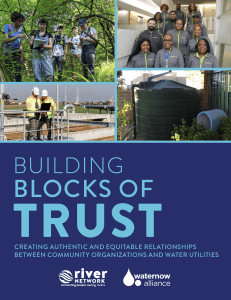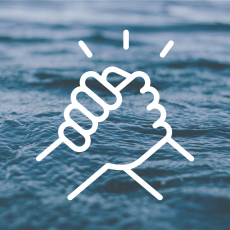Building Blocks of Trust: Creating Authentic and Equitable Relationships Between Community Organizations and Water Utilities
 Want to know how to build strong relationships with your local water utility for clean and safe water? Learn from successful partnerships around the country in our report with WaterNow Alliance, Building Blocks of Trust: Creating Authentic and Equitable Relationships Between Community Organizations and Water Utilities.
Want to know how to build strong relationships with your local water utility for clean and safe water? Learn from successful partnerships around the country in our report with WaterNow Alliance, Building Blocks of Trust: Creating Authentic and Equitable Relationships Between Community Organizations and Water Utilities.
In this report you’ll find best practices and case studies you can apply locally to create and bolster relationships that will improve the health of waterways and communities.
Trust between water utilities and community organizations is critical for successful decision making and investing that leads to safe, clean and sustainable water for all, and we hope that the lessons shared in our report can help seed and inspire many more such relationships.
For a summary of the report, download this three-page summary of all the Building Blocks or watch the videos below: a highlight video telling the story of this work and a recent Peer Call with participating partnerships.
NEW! Set up your own Community Water Academy, based on the Building Blocks, with our Ripples of Change Toolkit. Community Water Academies provides water managers and the communities they serve a forum to better understand local issues and needs as one step to creating and maintaining equitable and durable partnerships. These Academies will help you fulfill the Building Block, “Deepen Community Understanding of Utility Roles and Responsibilities.”





